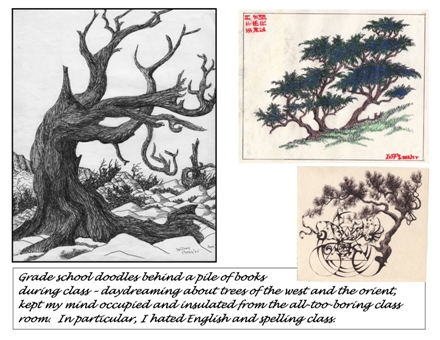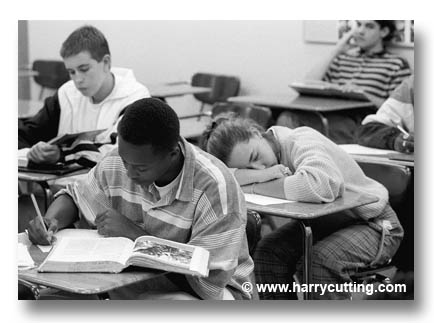 He threw his right hand up from the kitchen table where we were sitting and said, “I don’t need to learn. I only have to read this to find out specific information or facts that I need to complete something else.”* He was referring to the worksheet in front of him. He was referring to the novel, unread, by his left hand. He continued speaking. He let the dam break. He told me that his classes consisted of droning lectures, mind-numbing, eye-numbing power points, work sheets, being read to and zoning out, pretending to read on his own for 40 and 50 minutes and zoning out, and period after period of time so dreadfully boring that he had grown to dislike all of it except for lunch and gym. He told me that he had never had a teacher whose class he found inspiring, who had excited him about a subject. I saw that when he was asked to write something, a rare enough event, the prompts were so prescriptive that all he had to do was fill in some blanks and transfer it to paragraphs, and that he did not believe that his work was important because he did not get graded essays back for weeks. I saw the returned essays. A grade scrawled in a corner and only a few, inane scattered comments in blots elsewhere — nothing designed to push him or to show that his voice was worth a personal response in the teacher’s voice.
He threw his right hand up from the kitchen table where we were sitting and said, “I don’t need to learn. I only have to read this to find out specific information or facts that I need to complete something else.”* He was referring to the worksheet in front of him. He was referring to the novel, unread, by his left hand. He continued speaking. He let the dam break. He told me that his classes consisted of droning lectures, mind-numbing, eye-numbing power points, work sheets, being read to and zoning out, pretending to read on his own for 40 and 50 minutes and zoning out, and period after period of time so dreadfully boring that he had grown to dislike all of it except for lunch and gym. He told me that he had never had a teacher whose class he found inspiring, who had excited him about a subject. I saw that when he was asked to write something, a rare enough event, the prompts were so prescriptive that all he had to do was fill in some blanks and transfer it to paragraphs, and that he did not believe that his work was important because he did not get graded essays back for weeks. I saw the returned essays. A grade scrawled in a corner and only a few, inane scattered comments in blots elsewhere — nothing designed to push him or to show that his voice was worth a personal response in the teacher’s voice.
 I tutor nine students who attend six different schools and the practices and experiences he let loose upon are so common as to be the standard. Across the board I hear of classrooms as dry as deserts; rote learning that desolates the imagination; literature presented in formats designed to render it as flat and sour as week old, mass produced, Wonder Bread; history taught without stories but as just comatose facts, inert, without context, without juice; science without marvels.
I tutor nine students who attend six different schools and the practices and experiences he let loose upon are so common as to be the standard. Across the board I hear of classrooms as dry as deserts; rote learning that desolates the imagination; literature presented in formats designed to render it as flat and sour as week old, mass produced, Wonder Bread; history taught without stories but as just comatose facts, inert, without context, without juice; science without marvels.
And again and again and again, in classroom after classroom, school after school, in science and language arts and history, goddamned worksheets. God__Damned___Worksheets — whose only purpose is to lead a student from one bit of information to the next bit. They are asked to graze, not read. In grazing so, they never learn to read, to see the whole context, to understand the abundant connections that are possible. Worksheets give themselves over to easy cheating, to an illusion of learning, to lots of empty grades. They are a disease.
This young man did not have to actually read the novel or his history or science text. He only had to read the worksheets and then skip from question to question, scribbling his answers in phrases. He had been doing this for years. Worksheets were the common link all the way back to elementary school. And gradually, infection by infection, he was being given over to a way of thinking that was fragmented, torpid, lifeless.
There are no ordinary jobs. Any work performed with integrity and maximum effort adds more dignity to the world, but I’m enough of a chauvinist about my occupation to think teachers must shoulder more responsibility to do their work to the best of their abilities each__day___without a collapse of nerve or effort. No one else stands before 5 or 6 rooms full of children each day. No other paid professional has the duty to challenge those children to think deeply. No other worker must imagine children’s futures and his or her accountability in giving them every possible academic tool to go out and flourish in those years to come.
Therefore, teachers have a moral duty to be painfully honest, even scathing, in their quiet judgments of their own tactics and effort. They must ask themselves questions: Is my classroom a place of daily, leaden tedium?** Could I stomach sitting through my classes, day after day, or would I too go numb inside? Do I treat my students as if they were simpletons? Do I consistently blame my students for their failures? Am I lazy? Am I intellectually lazy? Do I look at my own practices with an unremitting, merciless eye? Do I complain… and complain … and complain? Do I have the balls to do the job as it should be done, as a vocation, as a mission, as a pursuit of something inestimably good and righteous?
Children deserve to be inspired in classrooms. They deserve passion. They deserve to be shown wonders. They deserve hard work. They do not deserve a gray wasteland ruled by apathetic instructors where they might drift, sheaves of worksheets in their hands.
*I asked him to repeat what he had said because in his frustration he had articulated an experience that I was seeing consistently but had been unable to nail down. This is an exact quote.
**Humor is an essential quality of any good classroom, but alone, without substance, it becomes merely entertainment.
How many teachers do I know as you describe?
Too many.